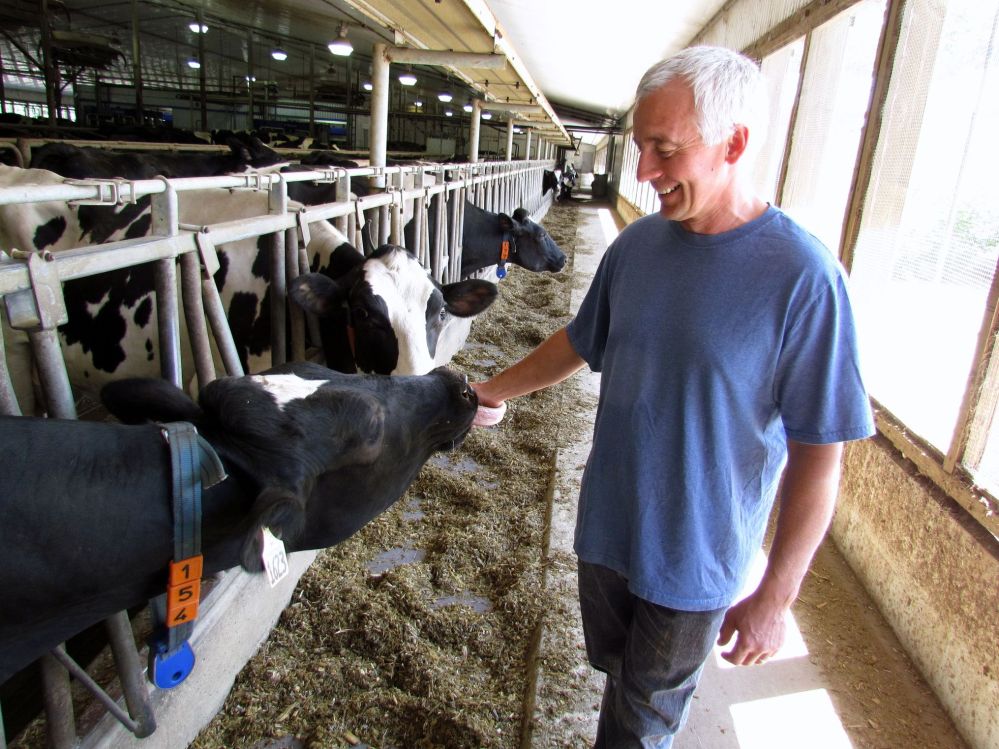Wiens wades into NAFTA fray
Advertisement
Hey there, time traveller!
This article was published 27/09/2018 (2476 days ago), so information in it may no longer be current.
A dairy farmer from Grunthal says he couldn’t have predicted his role with a federal advocacy group would one day land him near the epicentre of high-profile negotiations that will determine the future of free trade in North America.
“It does feel surreal at times,” David Wiens told The Carillon Monday.
“I consider myself a small town prairie boy, and when I started all of this, I would not have had the remotest idea that it would somehow unfold this way.”

When he isn’t serving as vice-president of Dairy Farmers of Canada, Wiens oversees 230 dairy cows at Skyline Dairy with his brother, Charles.
But lately, NAFTA renegotiations instigated by the United States government have consumed much of his time, requiring 10 trips to Washington, D.C. over the past 13 months.
Wiens said he learned to embrace the high-stakes environment as a chance to defend Canada’s “family-oriented” dairy industry, and likes to remind himself of the “human toll” trade negotiations have on a producer’s livelihood.
“This is some attention we were certainly not looking for, but we’re in it, and we have to make the most of it.”
A typical day in Washington sees Wiens brief elected officials or meet with agriculture industry partners, but his most important task is lobbying negotiators to ensure Canadian dairy industry interests remain at the forefront of their minds.
“They kind of give us a high-level update on the negotiations, although they never get into any specifics,” he said, due to a pact between Foreign Affairs Minister Chrystia Freeland and her U.S. counterpart, Robert Lighthizer, to avoid negotiating in public.
Wiens also attends receptions and other official functions surrounding the negotiations.
Preserving Canada’s supply managed dairy industry is chief among his concerns.
Wiens said the production model, which imposes controls on imports and pricing in an effort to standardize quality, avoid shortages and surpluses, and protect farmers, is of the utmost importance to Dairy Farmers of Canada.
“Canadian standards reflect the values of Canadians, and Canadian consumers,” he said. “People want to know, where did their milk come from?”
But the system has been harshly criticized by U.S. officials, who favour a free market model that would allow their dairy farmers to gain more access to Canadian supermarket shelves.
Wiens said he disagrees with those who argue supply management results in higher prices for dairy products in Canada.
“When we compare to other markets around the world, we’re in a lot of cases a little bit lower price, and in a few cases just slightly higher, but it’s all fairly close.”
American consumers pay twice for milk, Wiens asserted, through store purchases and government subsidies paid to dairy farmers who must dump out their perishable surpluses.
Wiens also worried about economic fallout if Canadian negotiators relented to American demands.
Dairy Farmers of Canada estimates 221,000 jobs and a $19 billion slice of the GDP stem from the Canadian dairy industry, Wiens said.
Contrary to Larry Kudlow, a top economic advisor to U.S. president Donald Trump who said “m-i-l-k” stands in the way of a trade deal, Wiens said his interactions in Washington lead him to believe “there is much more within the negotiation that is not near settlement.”
While deadlines for reaching a trade deal have come and gone, Wiens declined to speculate on when the negotiations might realistically conclude. For now, he said he hopes Prime Minister Justin Trudeau follows through on his stated support for supply management.
Recent Canadian trade deals with European Union and Pacific Rim countries ceded a small amount of international access to the Canadian dairy market, but Wiens estimated the industry could stand to lose $250 million in revenue annually as a result.
He hopes similar concessions won’t be made in the NAFTA talks.
“We’re to the point where enough is enough. To constantly give out little bits and pieces of the dairy industry weakens us,” he said. “This can’t continue.”
